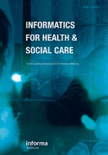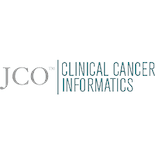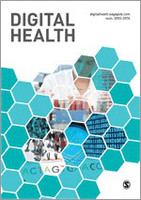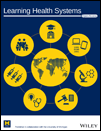
Informatics for Health & Social Care
Scope & Guideline
Transforming health through innovative informatics.
Introduction
Aims and Scopes
- Health Technology Assessment and Implementation:
The journal emphasizes the evaluation and implementation of health technologies, including mobile health applications, electronic health records, and telemedicine solutions, to improve patient care and outcomes. - User-Centered Design and Usability Testing:
There is a strong focus on the usability of health informatics tools, ensuring they meet the needs of diverse populations, including older adults and caregivers, through comprehensive user-centered design methodologies. - Data-Driven Decision Making:
The journal promotes the use of data analytics, machine learning, and artificial intelligence to inform decision-making processes in health care, enhancing predictive capabilities and operational efficiencies. - Ethical Considerations in Health Informatics:
Ethics in the use of technology in health care is a core area of focus, addressing issues such as privacy, consent, and the ethical implications of monitoring and data collection. - Integrative Approaches to Health and Social Care:
The journal explores integrative models that combine health informatics with social care, emphasizing the importance of a holistic approach to patient and community health.
Trending and Emerging
- Artificial Intelligence and Machine Learning in Health Care:
There is a significant increase in research focusing on artificial intelligence and machine learning applications for health care, particularly in predictive analytics and personalized medicine. - Mobile Health (mHealth) Innovations:
The growth of mobile health technologies is a prominent theme, exploring new applications and their impacts on self-care, chronic disease management, and patient engagement. - Digital Health Workforce Development:
Emerging themes focus on the empowerment and training of the digital health workforce, particularly in underserved regions, highlighting the need for skills development in health informatics. - Social Determinants of Health and Digital Solutions:
Research increasingly addresses the intersection of social determinants of health and digital health solutions, emphasizing the importance of addressing social factors in health care delivery. - Patient Engagement and Empowerment:
There is a rising trend in exploring strategies for enhancing patient engagement through technology, including co-designing applications with users to better meet their needs.
Declining or Waning
- Traditional Health Informatics Models:
There has been a noticeable decrease in studies focusing solely on traditional health informatics models without integrating modern technologies or user-centered approaches. - Generalized Telehealth Applications:
The frequency of papers discussing generic telehealth solutions has diminished, likely due to a shift toward more specific and tailored interventions that address unique patient populations and needs. - Static Data Reporting Mechanisms:
Research centered on static data reporting tools has become less frequent. The emphasis is now more on dynamic, real-time data utilization and analytics rather than merely reporting collected data. - Broad Public Health Surveillance:
There is a declining interest in broad public health surveillance topics, with a shift toward more targeted studies focusing on specific populations or health conditions rather than generalized public health concerns. - Purely Quantitative Studies:
The journal is seeing fewer purely quantitative studies, as there is a growing preference for mixed-methods approaches that incorporate qualitative insights alongside quantitative data.
Similar Journals

BMC Medical Informatics and Decision Making
Empowering health policy through data-driven insights.BMC Medical Informatics and Decision Making is a leading journal in the fields of medical informatics and health policy, published by BMC since its inception in 2001. With an impressive impact factor reflecting its status as a Q1 journal in both Computer Science Applications and Health Informatics, it serves as a vital resource for researchers, professionals, and students dedicated to advancing healthcare through informatics. The journal is committed to disseminating high-quality, peer-reviewed research focused on the innovative use of information technology in healthcare, decision-making processes, and policy formulation. As an Open Access platform, it ensures that findings are widely accessible and can foster collaboration across various disciplines. Positioned at the cutting edge of health informatics, BMC Medical Informatics and Decision Making aims to influence practice and inspire new research directions, making it an essential publication for anyone involved in improving health systems worldwide.

JCO Clinical Cancer Informatics
Connecting researchers and practitioners for a cancer-free future.Welcome to JCO Clinical Cancer Informatics, an esteemed journal at the forefront of the intersection between oncology and health informatics. Published by Lippincott Williams & Wilkins, this journal is dedicated to advancing the understanding and application of cancer data through innovative informatics solutions. Since its inception in 2017, JCO Clinical Cancer Informatics has established itself as a critical resource for researchers, practitioners, and students, as evidenced by its high rankings in the 2023 Scimago Quartiles—Q2 in Cancer Research and Q1 in both Health Informatics and Oncology. With a commitment to open access, this journal aims to disseminate groundbreaking research findings that enhance cancer care and inform public health strategies. Positioned in the United States, it serves as a pivotal platform for sharing knowledge and fostering collaboration within the global cancer research community.

INFORMATION RESEARCH-AN INTERNATIONAL ELECTRONIC JOURNAL
Advancing Knowledge in Library and Information Sciences.INFORMATION RESEARCH - AN INTERNATIONAL ELECTRONIC JOURNAL is a distinguished open-access journal published by the University of Sheffield's Department of Information Studies, situated in England. Since its inception in 1995, the journal has been at the forefront of disseminating research findings in the field of Library and Information Sciences, earning a commendable Q2 ranking in the category for 2023. With an ISSN of 1368-1613 and an E-ISSN of 1368-1613, it serves as a vital resource for scholars, practitioners, and students alike, providing a platform for innovative insights and engaging discussions. The journal accepts submissions from diverse perspectives related to the information research domain and contributes to the ongoing dialogue among academic professionals worldwide. With a Scopus ranking placing it at 150 out of 280 in its field, this publication underscores its importance in shaping the future of information studies while enabling wide accessibility to cutting-edge research.

International Journal of E-Health and Medical Communications
Connecting the dots between technology and patient care.Welcome to the International Journal of E-Health and Medical Communications, a pivotal publication designed to bridge the gap between health informatics and computer science applications. Published by IGI Global, this journal serves as a platform for innovative research and insights into e-health technologies, health communication strategies, and the evolving role of digital tools in enhancing healthcare delivery and management. With an ISSN of 1947-315X and E-ISSN 1947-3168, it caters to an audience keen on advancing the intersection of technology and health, as evidenced by its respectable standings in Scopus rankings—positioned in the 64th percentile in Health Informatics and 63rd in Computer Science Applications. Over its publication history from 2010 to 2024, the journal has consistently contributed to significant discussions and advancements within these fields, highlighted by its Q3 quartile ranking in 2023. Join a community of researchers, professionals, and students dedicated to the ongoing exploration of e-health, as we collectively navigate the complex landscape of healthcare innovation.

JOURNAL OF MEDICAL INTERNET RESEARCH
Shaping the Future of Digital Health PracticesJOURNAL OF MEDICAL INTERNET RESEARCH, published by JMIR PUBLICATIONS, INC, stands as a pivotal resource in the field of Health Informatics, with an esteemed ranking of #7 out of 138 in the Scopus database, placing it in the top 95th percentile. Since its inception in 1999, this Open Access journal has been committed to disseminating high-quality, peer-reviewed research that explores the intersection of healthcare and internet technologies. With its headquarters in Toronto, Canada, the journal encompasses a broad range of topics, including eHealth, telemedicine, and mobile health innovations. The impact factor and its Q1 quartile ranking highlight the journal's significant influence and prevalence in advancing the understanding of digital health landscapes. Researchers, professionals, and students alike benefit from its valuable insights, making the JOURNAL OF MEDICAL INTERNET RESEARCH an essential tool for fostering informed practices and policy-making in the rapidly evolving domain of health informatics.

Journal of Information and Communication Technology-Malaysia
Fostering Global Collaboration in Information TechnologyJournal of Information and Communication Technology-Malaysia is a respected open-access journal published by UNIV UTARA MALAYSIA PRESS, dedicated to advancing knowledge in the fields of Information Technology, Computer Science, and Mathematics. With an ISSN of 1675-414X and an E-ISSN of 2180-3862, this journal has been providing a platform for innovative research since its establishment in 2009. The journal is indexed in Scopus with commendable rankings in Mathematics and Computer Science categories, highlighting its contribution to the academic community, particularly with its Q3 quartile status in both fields as of 2023. As it converges research from 2011 to 2024, the journal invites submissions that explore contemporary challenges and technological advancements, catering to a global audience of researchers, professionals, and students interested in the rapidly evolving domains of ICT. By ensuring open access to its articles, the journal promotes widespread dissemination and accessibility of cutting-edge research, thereby supporting the collaborative development of ideas and solutions in these critical areas.

Digital Health
Advancing Knowledge at the Intersection of Health and Technology.Digital Health is a pioneering open-access journal published by SAGE Publications Ltd, dedicated to advancing the field of health technology and its intersection with health policy, informatics, and the broader medical landscape. Since its inception in 2015, the journal has rapidly established itself as an essential resource for researchers, professionals, and students, serving as a platform for innovative research that leverages digital tools to improve health outcomes. Currently ranked in the Q2 category across four relevant domains, including Computer Science Applications and Health Informatics, it commands respect within the academic community. With its accessible framework, Digital Health facilitates the dissemination of critical findings and new methodologies that inform policy and practice. The journal’s commitment to open access promotes worldwide access and cooperation, making significant contributions to the evolving landscape of digital health.

BMJ Health & Care Informatics
Exploring Cutting-Edge Solutions for Modern Health ChallengesBMJ Health & Care Informatics, published by the esteemed BMJ Publishing Group, stands at the forefront of the rapidly evolving field of health informatics. Established as an Open Access journal in 2019, it is dedicated to disseminating high-quality research that enhances the integration of health care with information technologies. With a prominent Q1 ranking in 2023 across categories such as Computer Science Applications, Health Informatics, and Health Information Management, this journal serves as an essential resource for researchers and practitioners alike. The journal is indexed in reputable databases and boasts impressive Scopus ranks—notably, it is placed #43 among Health Informatics journals. The aim is to foster innovation and understanding in health care practices through rigorous research and collaboration. Encompassing a wide spectrum of topics within health data science, usability, and outcomes research, BMJ Health & Care Informatics is pivotal for anyone involved in advancing health care through technology.

JMIR Medical Informatics
Unlocking the Potential of Medical Data for Better OutcomesJMIR Medical Informatics is a leading open access journal dedicated to the field of medical informatics, published by JMIR Publications, Inc. since 2013 in Canada. With an impressive impact factor and a distinguished Q2 ranking in both Health Informatics and Health Information Management categories, this journal plays a pivotal role in disseminating cutting-edge research and innovative practices. Covering a wide scope that includes clinical informatics, health information systems, and data analytics, JMIR Medical Informatics provides valuable insights for researchers, practitioners, and policymakers alike. The journal is accessible to a global audience, ensuring that pioneering studies and methodologies reach those who can apply them to enhance health outcomes. With its commitment to advancing the body of knowledge in medical informatics, this journal stands as a vital resource for anyone involved in or studying the intersection of healthcare and technology.

Learning Health Systems
Empowering healthcare with cutting-edge knowledge.Learning Health Systems is a premier open access journal published by WILEY that has been at the forefront of innovation in the fields of Health Informatics, Health Information Management, and Public Health since its inception in 2016. With a dedicated focus on the intersection of clinical practice and health technology, this journal is pivotal for researchers, professionals, and students seeking to advance the knowledge base in these critical areas. The journal enjoys a robust reputation, boasting a Q1 ranking in multiple categories as of 2023, and ranking within the top percentiles in both Medicine and Health Professions across various metrics. Designed to foster collaboration and dissemination of cutting-edge research, Learning Health Systems is committed to bridging gaps between data science and practical health applications while providing an accessible platform for transformative ideas. It invites contributions that challenge existing paradigms and promote innovative solutions that enhance healthcare delivery and patient outcomes.